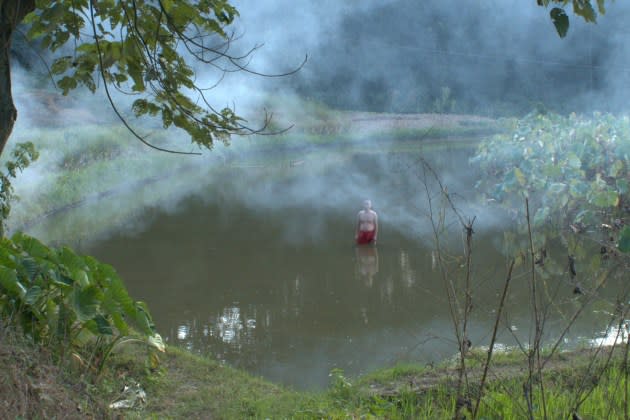Chinese Film Director Barred From Attending Singapore World Premiere of Documentary

Chinese authorities have banned artist and film director Guo Zhenming from traveling to Singapore for the world premiere of his documentary film “Tedious Days and Nights.”
The film is scheduled to play at the Singapore International Film Festival on Dec. 4 in the festival’s Standpoint strand. It was advertised as including a Q&A session with the director.
More from Variety
Fan Bingbing to Receive Cinema Icon Award at Singapore Film Festival
Malaysia's 'Tiger Stripes' Set as Singapore Film Festival Opening Title - Global Bulletin
Organizers of the SGIFF told Variety that they are still planning to press ahead with the screening, but they will do so in the absence of the filmmaker. “SGIFF will stand by our selection and will continue to present the world premiere of ‘Tedious Days and Nights’,” a spokesman told Variety.
Guo, who was previously detained for 15 days in December last year, had his passport destroyed in May by authorities in Yunnan Province. His recent application for a new passport has been rejected due to restrictions placed upon him in Lijiang, Yunnan, Guo told Radio Free Asia.
A friend and fellow artist, Ji Feng, also told the broadcaster that Guo was placed under an official travel ban on Sept. 27 by police in Guizhou.
Guo’s film deals in the more dilapidated aspects of Chinese society, notably how the country’s economic rise has left some folks behind, a subject that has sometimes but not always caused problems for other mainland filmmakers. “Tedious” also touches on the 1989 Tiananmen Square massacre, which is one of the most taboo subjects in China.
“Poet Zeng Dekuang returns to the former industrial town of Coal Dam after 30 years of wandering to find the place in disrepair — much like the promise of his youth that has dimmed in middle age. Rather than resist time’s decay, Zeng and his old friends drift into it with abandon and return to their basest of impulses, sometimes with comedic failure, but mostly in drunkenness,” the SGIFF program notes on the film read. “Poetry punctuates the tedium of aimlessness and melancholic recollections. In ‘Tedious Days and Nights,’ the Tiananmen Square massacre continues to haunt a lost generation of Chinese artists. As the men frolic about ruins, this documentary enacts a passive resistance equivalent to the tang ping (‘lying flat’ or dropping out) movement of Chinese youths today.”
On June 4, 1989, soldiers were used to put down a student-led rebellion in Tiananmen, central Beijing. While exact numbers are unclear, it has been estimated that hundreds, perhaps thousands, of civilians were killed. Discussion of the events are largely suppressed in public channels in China and censored on Chinese social media.
“Tedious Days and Nights” is understood not to have the so-called Dragon Seal, a mark of approval that appears in the pre-title credits of films that have received censorship approval from the mainland Chinese authorities. Without the seal, it cannot be shown in Chinese theaters, nor can it be legally screened at overseas festivals.
The SGIFF festival catalog indicates that the film will be shown with a R21 rating in Singapore, the most restrictive classification category in the country, limiting it to audiences aged 21 or older. The rating reflects the film’s “sexual scenes, coarse language and nudity,” the festival spokesman said. Variety was unable to verify the classification on Singapore’s online movie rating database.
But Guo’s other activities, rather than the contents of the movie, may instead be the cause of his problems.
Guo last year made public comments about the so-called white paper movement, in which members of the public aired their grievances about the ruling Communist Party with blank sheets of paper, rather than specific complaints. He was detained for “picking quarrels and provoking trouble,” a broadly defined crime often used against activists, lawyers and media workers.
Later, Guo was also a signatory to an online petition that circulated in favor of women’s rights. The petition was launched following a case in Jiangsu Province in which a woman was trafficked three times and purchased by a family that kept her chained up in an outhouse. In April, six people received jail terms of up to 13 years for abuse and wrongful imprisonment.
“I was going to attend the world premiere [of my film] at the … Singapore International Film Festival on Dec. 4, so I was eager to apply for a passport so I could leave the country,” Guo told RFA. “But the Lijiang municipal police department refuses to accept my passport application, saying that I am suspected of being a threat to national political security. I’m banned from leaving the country.”
Guo studied literature at Hunan Normal University and completed his MA in art history at the Fine Arts Department of Yunpan University. “Tedious Days and Nights” is his first feature.
Best of Variety
Sign up for Variety’s Newsletter. For the latest news, follow us on Facebook, Twitter, and Instagram.

